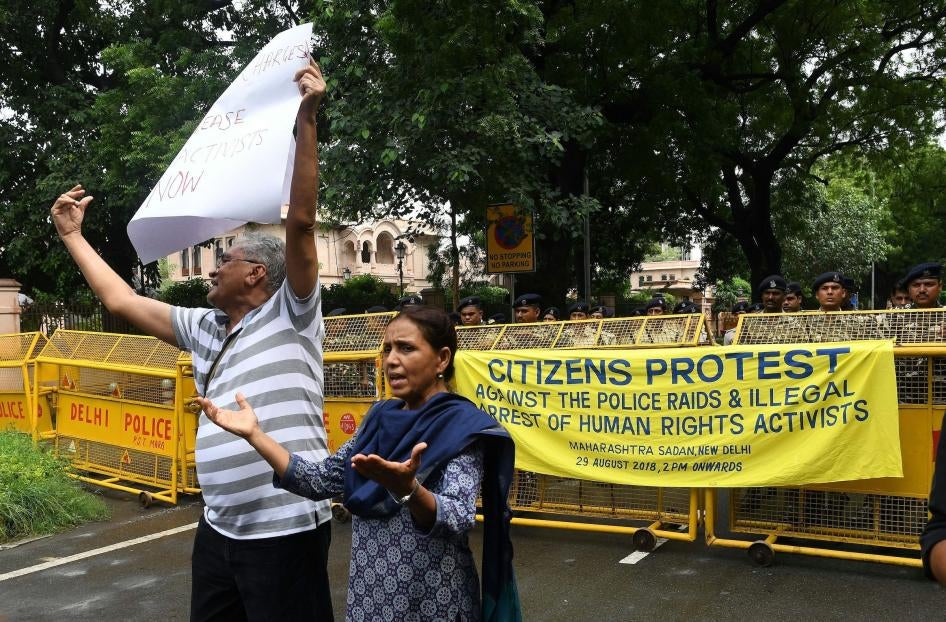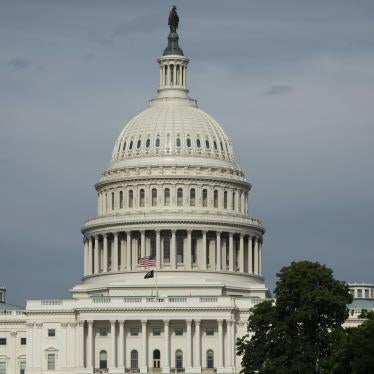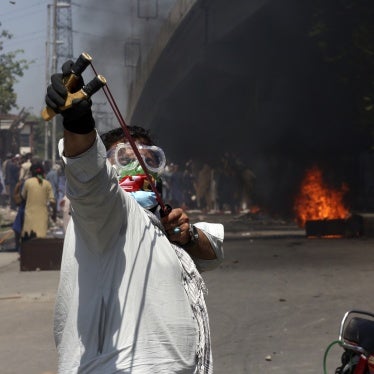Democracy is on the ballot in 2024” is starting to become a cliché, as candidates in some of the 60-plus countries holding elections this year espouse overtly authoritarian agendas. But protecting democratic systems is about much more than whether would-be autocrats win elections.
We need to look beyond the candidates and at the systems surrounding them.
Calling Out Repression and Pursuing Accountability
In some countries, elections are a pretense to generate the thinnest veneer of legitimacy for governments founded in repression. In recent elections in Egypt and Bangladesh, the winners — Abdel Fattah El-Sisi and Sheikh Hasina, respectively — were effectively predetermined, with the political opposition and government critics facing judicial persecution, harassment, or state violence.
Ahead of Pakistan‘s February 8 parliamentary elections, the government marginalized and cracked down on opposition parties and muzzled the media and civil society. Zimbabwe’s August election was marred by abductions, arbitrary arrests, and strict restrictions on freedoms of expression and association.
Similar dynamics are at issue in Russia, Iran, Algeria, Rwanda, Myanmar, Venezuela, and Azerbaijan, all of which have scheduled elections this year. Yet election plans can sometimes create openings to push governments in more rights-respecting directions.
Such pressure recently bore fruit in Guatemala, where repressive authorities linked to corrupt networks sought to control the outcome of the 2023 presidential election, opening spurious criminal prosecutions against opponents, independent prosecutors, and civil society leaders.
But voters expressed their disgust by voting for an independent candidate, Bernardo Arévalo. And thanks to a combination of peaceful protests led by Indigenous groups and growing international pressure — with the U.S. and the EU imposing a slew of sanctions on abusive and corrupt officials — Arévalo took office on January 15 despite authorities’ efforts to block him.
Defending Independent Institutions and Vibrant Civic Spaces
Populists often entrench themselves in power by eliminating checks on their control — for example, by intimidating or co-opting independent courts, elections officials, and media.
In El Salvador, President Nayib Bukele used his popularity to purge the judiciary and bypass constitutional term limits before running for, and winning, reelection on February 4.
Tunisia, Turkey, Botswana, Mozambique, and South Africa are holding elections this year against backdrops of systematic attacks on independent institutions. In India, authorities under Prime Minister Narendra Modi have sought to undermine independent institutions, are misusing federal investigative or tax authorities for politically motivated harassment and charges, and have opened an assault on civil society organizations, critical media, and political opponents.
In Indonesia, which holds elections on February 14, a controversial Constitutional Court ruling changed the rules to lower the age for certain offices to enable President Joko Widodo’s son to run as vice-president this year. In the United States, some officials aligned with former President Donald Trump at the state and local level have taken over election administration with the apparent goal of manipulating the system in their candidate’s favor.
A related problem is the deliberate discrediting of electoral systems, the spread of election-related disinformation, and the refusal to recognize legitimate outcomes, as has happened in the United States and Brazil in recent years.
Attacks on independent institutions are major steps toward dismantling democratic systems, and international actors should treat them as such. In the Americas, the 2001 Inter-American Democratic Charter makes clear that all governments have an “obligation” to promote democracy, including the separation of branches of government. Likewise, the EU should stand up firmly for treaty obligations of respect for democracy, rule of law and human rights, and step up its scrutiny of Hungary for its attacks on these standards.
Media and social media companies have a key role to play in facilitating robust public debate and ensuring, through independent fact-checking and other measures, that their platforms do not amplify disinformation and propaganda designed to further autocratic, abusive agendas.
Dismantling Corrupt Networks That Capture States
Another threat to accountable democratic governance is corruption by senior officials who abuse power to benefit themselves and their cronies. Often, these networks support outright autocracies, as in Peru during the government of former President Alberto Fujimori. After a bribery scandal led Fujimori to flee the country in 2000, independent prosecutors charged him and more than 1,500 individuals with offenses related to high-level corruption through which he kept his hold on power.
In Mexico, Colombia, and now Ecuador, organized crime undermines democratic systems via corruption, intimidation, and killings of officials, candidates, and social leaders who threaten their interests. More than 100 candidates or elected officials were killed in the lead-up to Mexico’s 2021 midterm elections, in many cases by criminal groups hoping to influence outcomes. In an extreme example, Haiti’s justice system has collapsed amid widespread violence by criminal groups and mistrust of Prime Minister Ariel Henry, whom many view as heading an illegitimate government linked to organized crime.
In Afghanistan before the Taliban’s 2021 takeover, Sri Lanka, Indonesia, and many African and Latin American countries, corruption has been a major driver of public cynicism and disenchantment with nominally democratic systems.
Disrupting corrupt networks’ ability to abuse power requires investing in effective systems to investigate and hold members of these networks accountable. This includes supporting independent news media, courts, and bodies like the UN Commission Against Impunity that operated in Guatemala between 2008 and 2019.
It also includes rights-respecting action to address loopholes in financial systems around the world that — as the Panama Papers and Pandora Papers investigations highlighted — provide opportunities for corrupt actors to hide their assets abroad.
Furthering Inclusion
Structural and explicit discrimination, including in elections themselves, can also delegitimize democratic systems.
This can happen through laws and practices that suppress voting by certain populations, such as U.S. laws disenfranchising people with criminal convictions and the 2023 voter ID laws in the United Kingdom. In Pakistan, electoral law provisions that require members of the Ahmaddiya religious community to register as “non-Muslim,” contrary to their beliefs, effectively deny them the right to vote.
Elections can be a springboard for divisive rhetoric and disinformation that incite fear and hatred against marginalized communities or pit groups against each other for electoral gains. In European Parliament elections, for instance, mainstream parties increasingly parrot such narratives instead of standing up for principled policies.
More broadly, the marginalization of racial, ethnic, religious, or other groups can undermine the core democratic principle of equal rights and fuel disengagement by those affected.
Democratic systems are under intense pressure across the globe. But it is only through a sustained focus on their quality — not just their leaders — that we can protect them.










